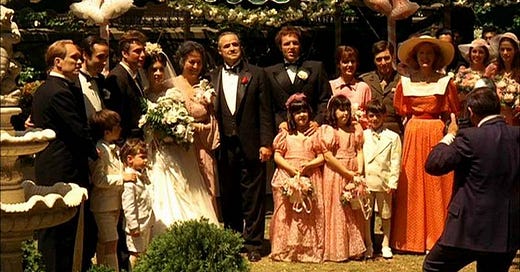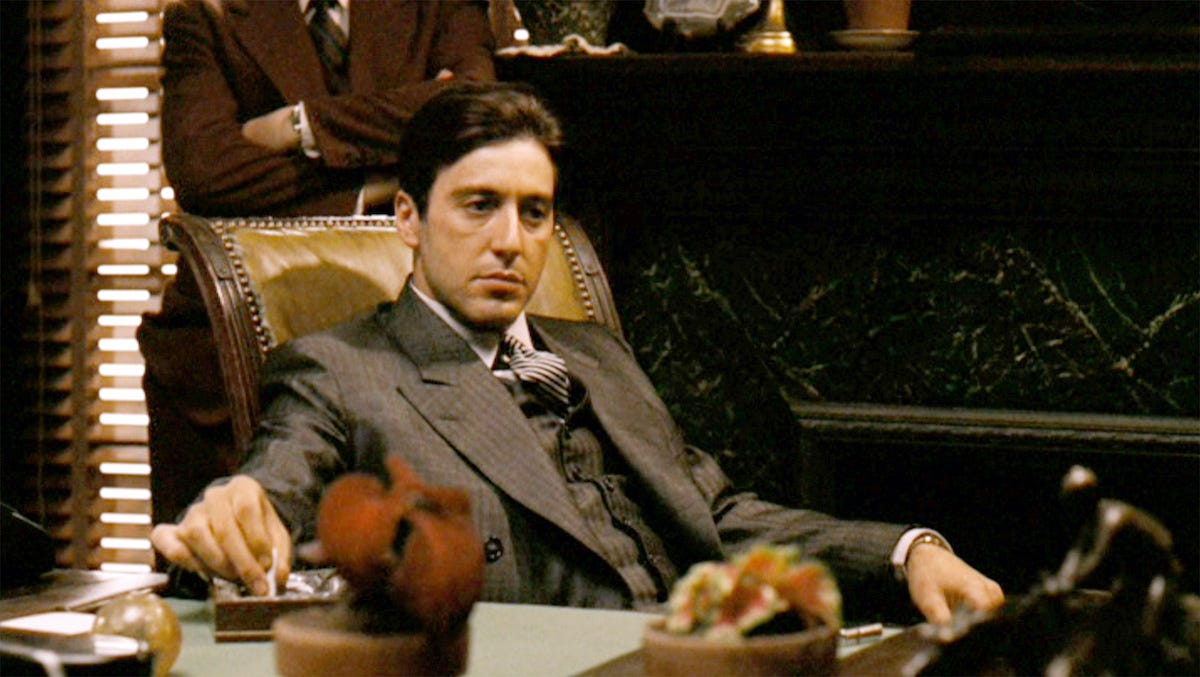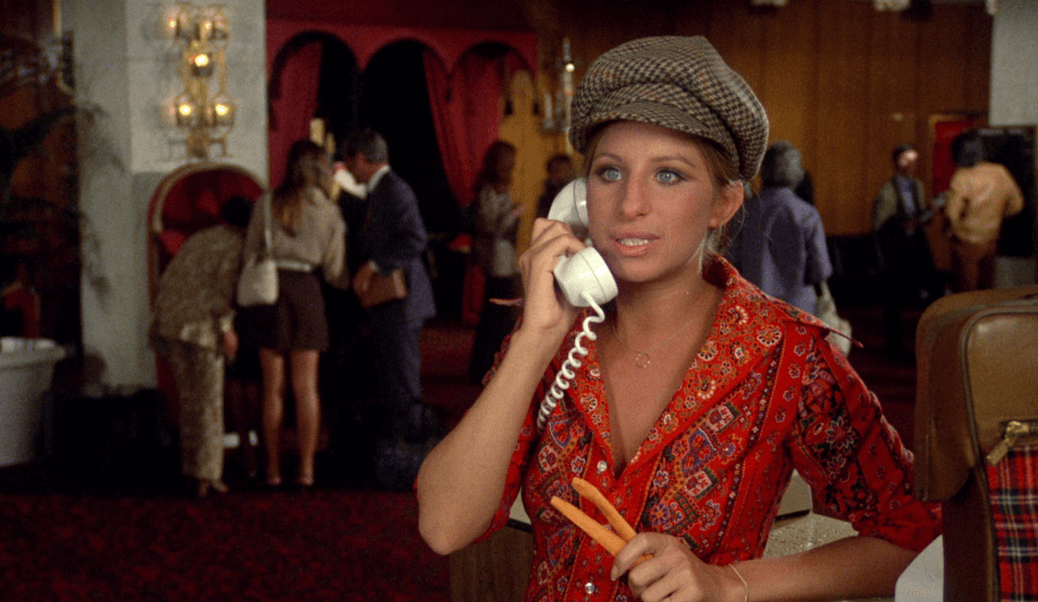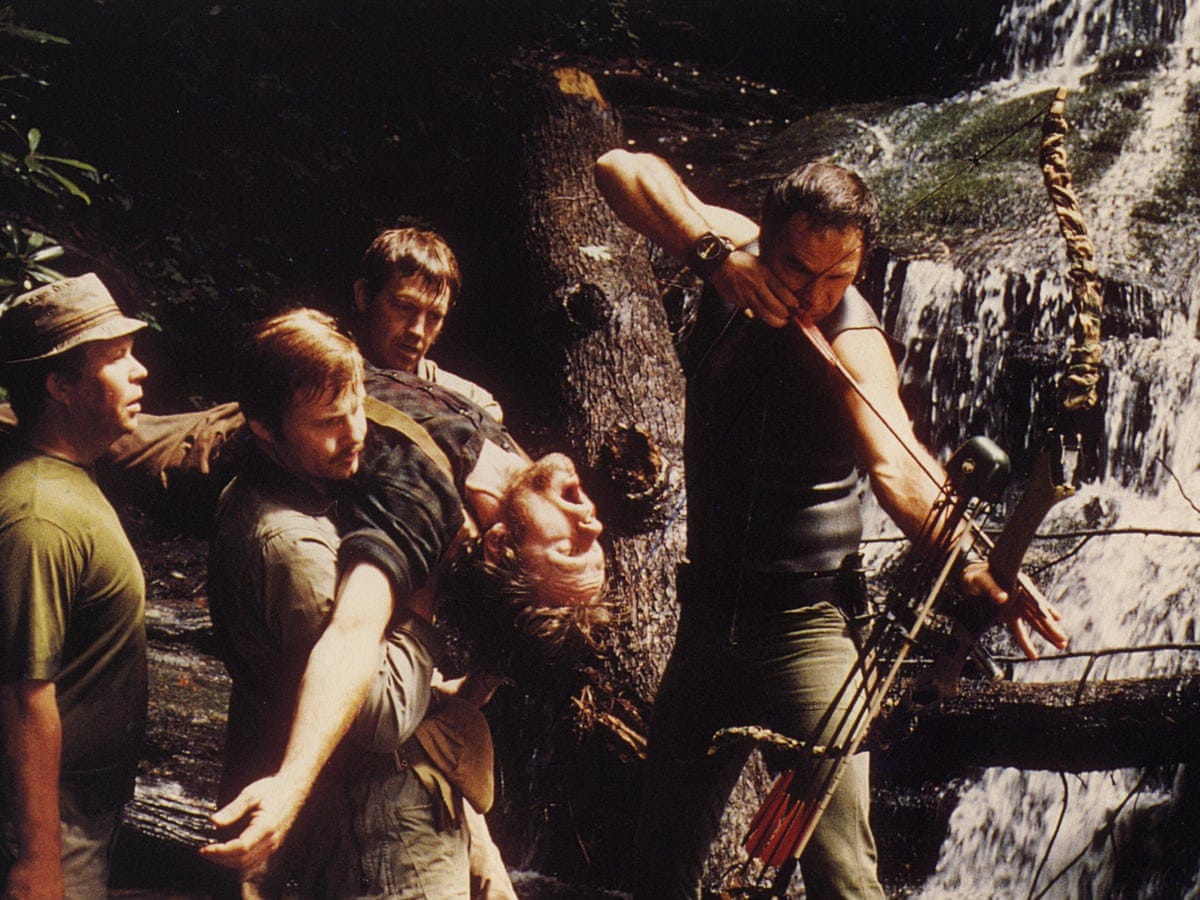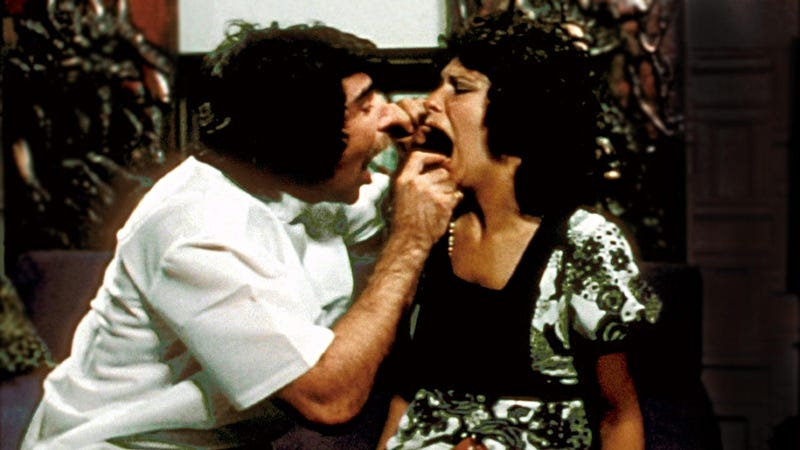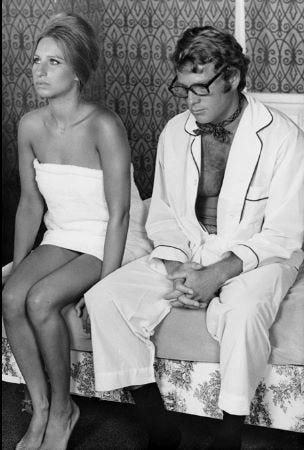American Culture and the Movies in 1972
Major box office hits shift popular opinion towards sex, violence, and the generation gap
Before I dive into 1972, I need to reference our current state of entertainment and popular culture (I’ll be very brief.) For starters, I just want to say I’m relieved the 2022 Academy Awards are over. When it came time to revisit the “Best” films of 2021 in late March, there was little to celebrate. I couldn’t think of a single film that latched onto the cultural conversation in a major way. The kind of movie that shouts its greatness from the rooftops and demands to be seen by every Grandma and eighth-grader alike. The type of “must-see-water-cooler-fodder” that we seldom get anymore. There was none of that, and there hasn’t been for a long time.
I know there are endless think pieces about this feeling of discontent with popular movies on the internet, and I’m not here to bemoan the state of the film industry right now. What I want to take a look at, is a particular year when the bestselling, box office hits were also the movies that dominated the Oscars. It was back when we had a monoculture, where the options to watch content were few.
The movies released in 1972 changed the way audiences consumed entertainment. This is a landmark year in movies, and it was the year that sex, violence, and pessimism penetrated mass culture in a major way. It’s in stark contrast to 2018 or 2019’s box office receipts which were mainly Marvel and Disney movies. In our current day, the top five grossing films of the year are family-friendly, inoffensive, tentpole films. In 1972? It was a screwball comedy, a disaster film, pornography, and two extremely violent dramas.
It’s surreal to look at these slates back-to-back, and see how much our popular tastes have changed, but why has it? What was going on in 1972, and why was there this immense appetite for thrills and titillation in movies?
I’m going to take you through these top-five grossing movies and tell you the honors they were bestowed, the major cultural flashpoints, and why they were also massive hits with audiences. Like I said all (except Deep Throat, c’mon) these films were nominated for Golden Globes or Academy Awards and also garnered big box office returns. This is what people were talking about, for better or worse. It reflected society back onto itself and set the stage for what was to come in a decade that grew increasingly chaotic as the years marched on. It’s almost as if these five films can tell the story of the 1970s all in one year, or at least how they began…
#1 - The Poseidon Adventure
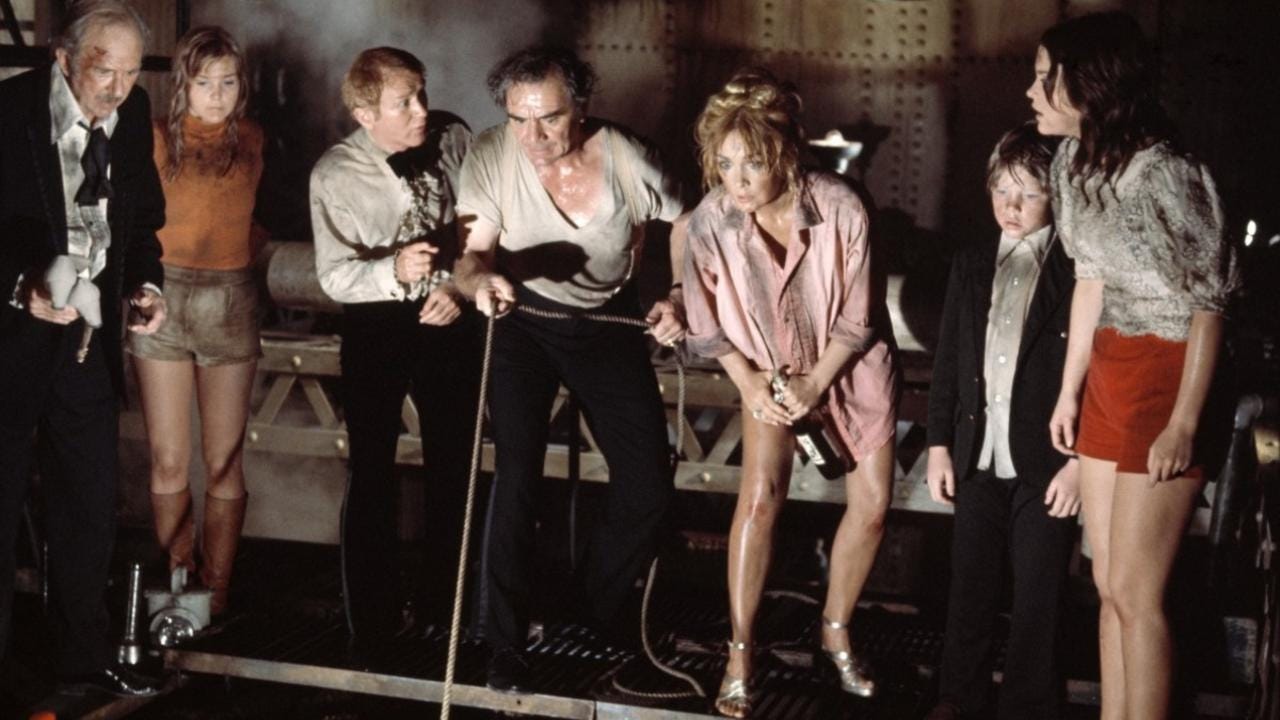
The highest-grossing movie of 1972 set the stage for disaster movies for the rest of the decade. The Poseidon Adventure was a major hit and grossed over $93 million in 1972 (that’s over $633 million in 2022’s dollars, which is the same ballpark as The Avengers: Infinity War.) The Poseidon Adventure is the story of an aging luxury cruise liner that is toppled by a tidal wave on its last voyage. The guests and crew must escape from the ship, and led by a young priest, do whatever it takes to survive.
The film was built on the success of the 1970 movie, Airport, the originator of the 1970s obsession with disaster flicks. Perhaps due to the increasing appetite for violent movies, and the increase of violent crime and its omnipresence in society, disaster movies were huge. What set the Poseidon Adventure apart from the others was the genuinely compelling story of these survivors, and also the special effects— it’s a well-made movie by an Academy Award-Winning Director!
The 1970s saw some directors devoting their storytelling to special and digital effects to make prestige movies (hey George Lucas and Star Wars!) What The Poseidon Adventure gave audiences was this spectacle of adventure done with new techniques that really impressed upon people the innovation that was coming to movies.
One of the reasons this film is revolutionary is the choice to cast an older generation of classic Hollywood talent in parallel to up-and-coming notable 1970s dramatic actors. The cast of The Poseidon Adventure was not B-movie or lowkey talent with little celebrity. These were Academy Award-winning actors, and respectable, noble elders in the film community like Shelley Winters and Harold Albertson. Pairing the classic film old guard with Oscar-winner Gene Hackman and other new Hollywood talent gave legitimacy, and also provided a narrative to the film’s major theme: the generational gap.
It was a weird time where old Hollywood stars from the 1930s and 1940s were becoming seniors, and the powers in the entertainment industry looked to a younger, hipper generation to fill the void. In American culture, baby boomers were becoming the majority of the population and entering the workforce. The older crowd needed to adapt and realize that to move forward as a society, the generations needed to respect each other and work together. I think we’re still in that space now, except Gene Hackman is in the old guard.
#2 - The Godfather
There’s absolutely no way I’m going to dive into a full-on description of The Godfather, which is considered one of the greatest films of all time by… everyone. However, I’ll attempt to quickly discuss why people were and still are so obsessed with The Godfather’s themes, and how truly timeless it is.
The entire narrative of the movie is based on a New York mafia family’s “Changing of the Guard” in the 1940s, where a younger family member who is not a prototypical mobster, reluctantly fulfills his destiny and joins. The family dynasty is on the brink of collapse unless the well-meaning, well-intentioned male heir can take the reins and bring some common sense back.
This movie is a dark but telling slice of life in the 1970s. It is one of the greatest examples of a tale of generational change and the baggage that comes with it. This was the time when baby boomers were coming of age themselves, and having their own existential crises. Additionally, the 1970s were an extremely violent decade, and this movie reflects that. There are multiple, graphic murders of main characters, and a laisse-faire attitude toward violence, if only for the sake of preserving the greater good. These were all things that to a greater extent were happening in American culture either on the international stage or in family homes. There was fear in the generation that fought in WWII. Were they witnessing their children become hippies and degenerates? There was anxiety that the American greatness of a previous era was dying.
To this day, these themes are still present in our culture wars, and it’s probably why generation after generation is obsessed with this story and these characters. There’s even a new show premiering soon about the dramatic making of The Godfather called The Offer. Even the creation of The Godfather had a dark underbelly and conveys the shifting social mores of the 1970s as much as the film does itself.
#3 - What’s Up Doc
What’s Up Doc is very funny and one of the most critically acclaimed romantic comedies of all time. It’s honestly a delightful movie, and captures the absurdity of modern romance, with some fun-loving sardonic flair in a classic Battle of the Sexes style motif. It stars Barbra Streisand, fresh off her Academy Award Winning role in Funny Girl, and Ryan O’Neal as her male love interest.
The entire movie is director Peter Bogdanovich’s homage to 1930s “screwball” comedies. Some pretty haywire moments happen throughout the plot including a jewel heist, a car chase, and instances of mistaken identity. The sheer craziness of all those elements feel both very 70s and also “screwball” at the same time, which is probably why the movie was so popular. In particular, this type of 1930s comedy is notable for female characters who dominate their male romantic partners - very modern in a Women’s Lib sort of self-reference! Barbra Streisand’s character demeans and challenges Ryan O’Neal’s masculinity, which is played for laughs because the man was a sex symbol in the 1970s.
Nostalgia is often the most powerful during times of unrest. People were disturbed by the environmental, geopolitical, and feminist shifts, and enjoying a viewing of a movie that took things back to the 1930s, was a way of finding solace in a confusing world. I think one of the most modern, and telling instances of this film, is the power of Barbra Streisand’s sexuality. She pushes the bounds of expectation, and through her own gumption radiates the vibe of a 1970s sexually liberated woman, which was a radically new idea in 1972. The movie’s appeal is due to both of these ideas: if you were into feminism and romance, there was Barbra, if you wanted to reminisce about the old days, here was Ryan O’Neal and a classic “screwball” comedy for you.
#4 - Deliverance
Deliverance was nominated for the Academy Award for Best Picture and was also a wildly popular action movie. The movie is a chilling survivalist thriller and is probably most famous for the line “squeal like a pig” that's delivered in Deliverance’s climactic anal rape scene between the Mountain Man and Ned Beatty’s character. It’s the story of four male friends who go on a weekend canoe trip that goes majorly wrong, in a classic man versus nature battle with some demonic hillbillies thrown in for good measure. It also showcases future superstar and Cosmopolitan centerfold, Burt Reynolds as the masculine ideal. Deliverance doesn’t hold back, and at times is grueling to watch.
The movie arrived when society was reeling with disillusionment with the social movements of the 1960s and The Vietnam War. Thousands of young men were sent to the jungles of Southeast Asia only to come home either in a body bag or messed up with heroin addiction and PTSD in the early 1970s. This was not the heroic homecoming of the previous generation.
The movie was beloved by a wide-reaching audience who rooted for these dudes to fight back against the forces of nature and savage hillbillies, no matter how dark the story or morally ambiguous the ending. It gave audiences a way to see themselves on screen – at least those who were more conservative, white, and middle-class, which at that time in The United States was ~60% of the population. As mentioned earlier, stories that provided a hypothetical scenario of war or disaster were popular, and therapeutic for those coping with a rapidly changing world. The feminist and social movements of the era were not as widely embraced as people assume. Most people were anxious about how quickly the world was changing, on all fronts. Deliverance was both a reflection of this anxiety and fantasy where people could imagine themselves in an epic battle with nature.
To further hint at the overt machismo of the production, the production of Deliverance opted to shoot the movie without any insurance protection for the cast or crew: um… WHAT? Yeah, that is a bold and dangerous move. The actors also performed all their own stunts without insurance in the wilderness of Northeast Georgia, and apparently every lead actor "had more guts than a burglar.” That's machismo for you!
#5 - Deep Throat
Yes, this is an adult film. It’s pornography, straight up, and it grossed over $45 million ($300 million in 2022 dollars) at the box office. So basically a porno was on par financially with 2018’s superhero-themed Aquaman.
There’s not much to explain in terms of the plot. A woman claims she cannot orgasm during sex, a Doctor diagnoses her with Deep Throat, meaning her clitoris is in her mouth, and then she proceeds to give oral sex. Yes, that’s it, that’s the plot. People were wild for this movie! Grandmothers went to the theater to see it. Even Vice President Gerald Ford attended a screening! Can you imagine sitting next to the Vice President of the United States during this movie?!
The reason Deep Throat broke through, and how this period in the adult film industry is best explained in my newsletter about Marilyn Chambers and the “porno chic” era in The United States. Like Marilyn Chambers’ Behind the Green Door, Deep Throat was one of the first adult films that were presented as a narrative story, similar to the way that the characters of Jack Horner and Dirk Diggler present their innovative film “Brock Landers” in the 1997 movie Boogie Nights.
What Deep Throat did, was tell people 1) look, most adults watch pornography, and 2) it’s okay to talk about it and enjoy it. This film went “viral” in the 1970s sense, and due to large-scale distribution by mob-funded production, the movie was able to screen by traveling around the country. Word of mouth built up, and it became a “must-see” movie.
By 1972, The Sexual Revolution was building, and for a brief era, porn stars received a fair amount of respect and clout in the entire film industry. Like Harry Reems, the man who played The Doctor in Deep Throat. He was tried for obscenity multiple times and stars like Jack Nicholson and Warren Beatty came to his rescue by paying for his legal bills. Just a decade earlier, there was no chance a mainstream movie star would even want to be associated with an adult film actor. Times were changing, and sexual liberation was announcing itself to mass culture.
I can’t believe these movies all came out in one year. I didn’t even get to mention the other films in the top-ten highest grossing like Cabaret or Last Tango in Paris, two extremely dark, sexually charged films that were very popular with audiences. The latter was discussed in depth with Deep Throat on Karina Longworth’s podcast You Must Remember This this week. I highly encourage a listen.
The anxious feelings toward the future and the cultural shifts that occurred in the early 1970s is happening now, so why don’t we have these sorts of movies raking it in at the box office? The major difference is due to the fragmented state of our pop culture landscape. We don’t have much of a mono-culture anymore because our viewing habits certainly aren’t conducive to shared experiences. We’re scattered into our little corners of like-minded individuals, and the only broad entertainment that breaks through is unfortunately super hero films and animation. It think the tides will turn soon. If a film like Deliverance or Last Tango in Paris can break through, there’s hope.
For Further Enjoyment-
Top Tracks:
Interview with Burt Reynolds in 1972 About Deliverance and Centerfold
The Poseidon Adventure’s Special Achievement Awards at the Oscars (1973)
B-Sides:
Siskel & Ebert 1979: Best Movies of the 1970s
Harry Reems Interview 1976 on his obscenity charges
**correction - 2018’s Aquaman was not Oscar-nominated

